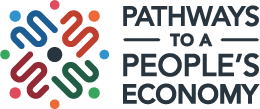Ensure community-governance and care of collective resources
Bring land, water, and utilities back into public and community-governance to restore collective stewardship of collective resources
Through the rise of colonialism and global capitalism, collective life-sources such as forests, water, land, and minerals have been systematically captured by state and corporate actors through privatization and often violent exclusion of local communities. This systematic privatization and erasure of local stewardship has catalyzed the rapid extraction, burning, and dumping of fossil fuels and other ecological resources, ultimately leading to our current climate crisis.
One specific example is the ocean commons, which is a self-regenerating source of food and life. According to the UN, nearly 3 billion people around the world depend on coastal and marine ecosystems for their livelihoods. Yet our oceans are facing the twin dangers of the climate crisis and further privatization and industrialization. We must ensure that coastal ecosystems continue to be ecologically and economically regenerative sources for communities in the US and around the world.
Whether it is our land, air, or water, climate justice necessitates the the management and stewardship of these commons be transformed to center community governance, especially by the Indigenous, Black, and brown communities who face disproportionate burdens of pollution and climate change. At this point, our community governance of collective resources must not be impact-neutral, but instead actively restorative to the living world.
Restore and protect coastal communities and ecosystems
- 40% of Americans live on the coasts. Marshes, wetland, and other coastal ecosystems can absorb up to five times as much carbon as land-based foliage and forests. Furthermore, these ecosystems provide crucial storm protection and flood control for coastal communities. Restoring them is less expensive and more effective than levies and seawalls.
- Restoring tribal sovereignty and treaty rights for coastal tribes, such as Coast Salish Peoples in the Pacific Northwest, directly impacts the protection and restoration of salmon runs. As a keystone species of northwest ecosystems in both freshwater and saltwater, renewal of salmon runs is foundational for ecosystem and economic health.
Ensure clean fresh water is a public right
- Enforce the Clean Water Act
- Move privately-owned water utilities into cooperative or public ownership
- Invest in cooperative enterprises that install and manage water and sewer services
- Invest in technical assistance and grant funds for rural, small municipal, and tribal communities for water and sewer infrastructure.
- Restore freshwater sources
- Healthy rivers are essential to local economies and ecologies. Whether as a food source, habitat, drought prevention, or local climate stabilizer.
- Remove outdated, unsafe, or costly dams
For example:
- Removal of the lower four dams on the Snake River. These four dams are devastating to salmon runs, energy inefficient, outdated, and very costly.
Establish democratic community-led landuse, conservation and green development processes
- PUSH Buffalo’s Green Development Zones: The GDZ is 25 square blocks in Buffalo that PUSH is intentionally shifting to be more sustainable and affordable for residents. They are using multiple strategies of policy advocacy, community economic development, and community organizing. They started by addressing the twin concerns of high utility bills and unaffordable housing. Ultimately they passed the Green Jobs- Green NY Law which covers free energy efficiency assessments, training for jobs in green industries, and low-interest financing for energy efficiency upgrades.
Invest in municipally-owned internet utilities, especially rural broadband
- Internet access and communications technology is crucial in the face of climate disasters. For first responders and communities to be able to navigate emergencies we must transition to democratically-controlled communications technology, rather than private corporate-owned internet utilities. The internet is a modern day commons that if being rapidly transformed to maximize profits rather than meet community needs.
For example:
- Chattanooga TN’s municipal internet. After private internet companies failed to meet the internet needs of the city of Chatanooga, the local government chose to treat broadband as a public utility and ultimately established the fastest internet in the United States. They are among 82 cities and towns that have established government-owned, fiber-based internet. It has transformed much of the local economy.
- Institute for Local Self-Reliance: Municipal Network Maps

